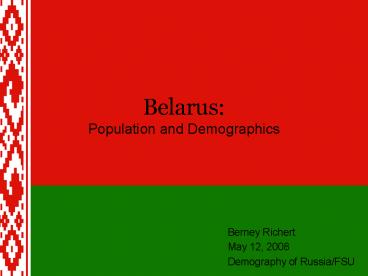Belarus: Population and Demographics - PowerPoint PPT Presentation
1 / 31
Title:
Belarus: Population and Demographics
Description:
Birth: fertility, family structure. Death: death rates, ... Nutrition: city residents eat twice as much fruit, half as many starchy grains (Shohotska 2006) ... – PowerPoint PPT presentation
Number of Views:379
Avg rating:3.0/5.0
Title: Belarus: Population and Demographics
1
BelarusPopulation and Demographics
- Berney Richert
- May 12, 2008
- Demography of Russia/FSU
2
Questions
- Where is Belarus?
- What are the population trends?
- Birth, death, migration
- Birth fertility, family structure
- Death death rates, aging, life expectancy,
health - Migration
- Population projections
- Comparison with Russia
3
Belarus map Europe
4
Belarus map with population
From CIA World Factbook
9.7 million people (2008 est.)
5
Population Trends
Based on data from Belarusian Ministry of
Statistics and Analysis
6
FSU percent growth, 1999
From Lecture 3
7
Selected FSU country population growth
Total population (1000s)
30,000
25,000
20,000
15,000
10,000
5,000
Year
From Lecture 3
8
Natural Growth
1000s
Total population
Number born Number died Natural growth
From Shakhotska (2007)
9
Birth, death, migration
Population change is the result of birth, death,
and (net) migration
10
Crude Birth Rate
Based on UN Statistics Division data
11
Population Pyramid (2008)
From Belarusian Ministry of Statistics and
Analysis
12
Age-Specific Fertility Rates
Births per 1,000
Age (years)
From Shakhotska (2007)
13
Total Fertility Rate
Children
Total fertility rate (overall) Total fertility
rate (urban) Total fertility rate (rural)
From Shakhotska (2007)
14
TFR Russia
From Lecture 3
15
Cohort Total Fertility Rate
Cohort birth year
Average number of children born to a woman in the
given cohort
From Shakhotska (2007)
16
Family Structure
- First children make up 55-60 of all births
(Subotka) - Unregistered marriages producing
- more children 8.5 of all births in
- 1990, 18.6 in 2000, 24.1 in 2005,
- 22.7 in 2006.
First child
Second child
Third child (or higher)
From Shakhotska (2007)
From Shakhotska (2007)
17
Family planning
- Abortion incidence decreasing
- 1995 193,300 abortions for 101,100 births (66
of all pregnancies) - 2003 80,200 abortions for 88,500 births (48 of
all pregnancies) - Modern contraceptive methods 27.8 of women in
1990, 40 in 2006
18
Crude Death Rate (deaths per 1,000)
Based on UN Statistics Division data
19
CDR Russia
From Lecture 8
20
Population Pyramid (2008)
From Belarusian Ministry of Statistics and
Analysis
21
The Belarusian Cross
The Russian Cross
From Lecture 3
Based on UN Statistics Division data
22
Aging
Based on UN Statistics Division data
23
Trends in Life Expectancy
Years
Men and women
Men
Women
From Shakhotska 2006
24
Health and Lifestyle
- Alcoholism Effect of Gorbachevs Campaign
1000s
Odin iz vyzovov
Number of deaths
Hypothetical number of deaths
From Shakhotska 2006
25
Health and Lifestyle
- Nutrition city residents eat twice as much
fruit, half as many starchy grains (Shohotska
2006) - Smoking 53.3 of men and 6.3 of women smoke
(2006), especially young and middle-aged
(Shohotska 2006) - Obesity 6 of men, 19 of women obese (2006)
(Shohotska 2006)
26
FSU migration flows
From Lecture 11
27
Ethnically motivated migration
Based on data from Belarusian Ministry of
Statistics and Analysis
28
Population Projections
Based on World Population Prospects data
29
How Does Belarus Compare With Russia?
- Higher fertility
- Longer life expectancy
- Lower crude death rate
- More stable economic and political system
- Problems still fundamentally similar to Russias
30
Sources
- Belarusian Ministry of Statistics and Analysis.
Ethnicity data available at http//belstat.gov.by/
homep/en/census/p5.php. Population figures and
pyramid available at http//belstat.gov.by/homep/e
n/indicators/population.php - CIA World Factbook. Belarus. 2008. Available
at https//www.cia.gov/library/publications/the-wo
rld-factbook/print/bo.html - Novosti.dn.ua. ??? ??????????? ??? ????????????
?????????? ?? ?????? ?????????. ????.
Available at http//novosti.dn.ua/details/23460/ - Shakhotska, Lyudmila. ???????? ??????????? ???
??????? ?? ??????? ??????????????? ????????????
?????????? ????????. ??????? ??????????, ? 10
(2007). ?vailable at http//demoscope.ru/weekly/2
008/0327/analit02.php - Shakhotska, Lyudmila. ?????????? ??? ???? ??
??????? ??????????????? ???????????? ??????????
????????. ??????? ??????????, ? 8 (2006).
Available at http//demoscope.ru/weekly/2008/0327
/analit01.php - Subotka, Tomas. Re-Emerging Diversity Rapid
Fertility Changes in Central and Eastern Europe
after the Collapse of the Communist Regimes.
Population, vol. 58, no. 4/5 (2003), 451-485.
Available at http//www.jstor.org/stable/3246652 - United Nations Statistics Division - Common
Database. Belarus. 2008. Available at
http//unstats.un.org/unsd/cdb/cdb_country_prof_re
sults.asp?crID112cpID21 - World Population Prospects. Belarus
(Population, 1995 to 2050). 2006 Revision
Population Database. Available at
http//esa.un.org/unpp
31
?h? End
From Novosti.dn.ua































